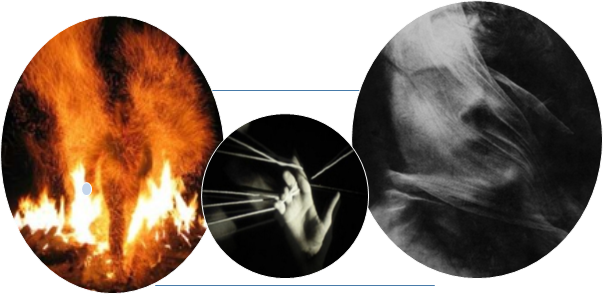Imaginary Lab 4 Sensations: Ineffable Archaelogies
This research group conceived as a laboratory is oriented to academic debates and innovative thinking in addressing new emerging phenomena in visual studies, and theoretical revisions or critical assessments within a large interdisciplinary community of scholars at IKK, and in the Humanities at large.
Our research forum welcomes senior scholars, as well as the PhD-, and the Postdoc- fellows, and young talented MA students, providing the academic context for a dialogue with the international academic community through periodical seminars, conferences, as well as a series of open lectures of excellence.

Specifically, the research group addresses impermanent phenomena of spreading sensory territorialities of ineffable stimuli through actions and visions within art history and outside it; in visual culture, or at the crossing of both art history and visual culture, to promote new disciplinary forms, such as archaeologies of soundscape, scent-scape, and other somato-scapes of sentience. We study meta-objects in paradoxical spaces defined by the metastability of the medium – both material and intangible – in transient motion. We explore the cluster of “scape-sentience-motion” within the emergent spaces of radiant objects, fleeting visions, shimmering presences, dazzling skies, and sounding shores.
In this examination, we take further the Stoic principle – hexis – the cohesive bond of unified bodies, the knot that binds human and animal bodies qua bones and sinews with the elemental in nature. A nature in constant inter-elemental change and transformation of coming to be one to the other. Water condensing and turning to stones and earth; the same thing dissolving and dispersing, turning to wind and air, and air, when ignited, turned to fire. This processual state of matter (events) is addressed within a phenomenological frame as understood by Merleau-Ponty: a phenomenology though [that] “is not, in the end, either a materialism or a philosophy of the spirit,” but a science that overcomes both “idealizations” by unveiling their “pretheoretical stratum.” Returning to ancient sites, refreshing old concepts.
Revisiting Lucretius’s poem De rerum natura through Michel Serres’ The Birth of Physics, we explore the poet’s meteorology and his topology where atoms flow at uncertain places and uncertain times – a paradigmatic chora space of potential visual and poetic images. The research group grants priority not only to the visual, but to the poetic as well, and to all imaginative aspects of language, sound, and soma-aesthetics. In our theoretical system, imagination plays a crucial role. We privilege the material imagination over the representational imagination as in Bachelard’s elemental imagination, and in Deleuze’s logic of sensation. Inspired by The Poetics of Space and The Poetics of Reverie by French philosopher Gaston Bachelard, we explore spaces where image becomes the place for poetic and ideating intersections, for temporal ruptures and suspensions. We seek to explore the energies and the forces of the image; the rhythm and the resonance that penetrate it, by which new imaginary opportunities are opened to image in circular movement. Time no longer flows horizontally, but it leaps up.
Homo imaginans is the logo of our identity, the premise of our research, and the belief in the inner capacity of human imaginative creativity. But as in Greek the words for men and stones resemble one another, we consistently follow the old adage according to which men grow from stones. It is then just natural that our imaginary field of vision should not cover the human alone, but every imaginative aspect of life that grows and grants access to “imaginary creation” and “imaginary vitality.”
Nicoletta Isar is Associate professor Art History and Visual Culture Department of Arts and Cultural Studies, Copenhagen University. She holds the title of docteur ès lettres in Byzantine studies from the University Sorbonne – Paris IV. She has long been involved with the theory of image as a scholar equipped in Classical studies, which enabled her in seizing the paradigm shifts of image throughout time, and in conducting comparative discussions around new phenomena in contemporary visual culture. Her research reflects her academic formation, as well as her intellectual horizon of all-embracing propensity for eclecticism within the comparative cultural studies, focusing continuously and consistently on themes reflecting the patterns of imagination and poetics, as they emerge in the visual, the acoustic, and lately in the sensory studies.
Researchers
Internal
| Name | Title | Phone | |
|---|---|---|---|
| Nicoletta Isar | Associate Professor Emerita | +4535329294 |
Mathias Srisakul Larsen, MA Art history
msl800@outlook.com
Thea Møller Jensen
ncv207@alumni.ku.dk
Hanna Louise Grønneberg
hanna@graf.no
Kristine Agergaard
k@jk-world.net
Kirstine Autzen
kirstine.autzen@gmail.com
Emily Kivistö
qjc146@alumni.ku.dk
Sofia Steinmetz
sdv217@alumni.ku.dk
Synnøve Thau-Moltsen
cqb201@alumni.ku.dk
External
Marcia Cavalcante, Professor of Philosophy, Söndetörn University Stockholm
Maria Gorea-Autexier, Professeur des Universités (Université Paris 8 / INHA, Paris)
Marie-Luce Liberge, Doctor in aesthetics, science and technology of the arts EDESTA (University Paris 8)
Calypso Gillet, MA Comparative literature, Paris 3, Sorbonne Nouvelle (France)
Peter Mark Adams, Author, poet and essayist specialising in the ethnography and visuality of ritual
petermarkadams@gmail.com
Alkistis Dimech, Writer and artist, dancer and choreographer. With Peter Grey, she is the co-founder of Scarlet Imprint.
alkistis.dimech@gmail.com
Dr Jasmina S. Ćirić, University of Kragujevac (Serbia)
jciric@f.bg.ac.rs
Maria Cristina Carile, University of Bologna (Italy)
mariacristina.carile@unibo.it
Andrew Simsky, Research Center for Eastern Christian Culture (Leuven, Belgium)
andrew_simsky@hotmail.com
Kathryn Dickason, University of Southern California & New York University (US)
dickason@alumni.stanford.edu
Nadine Schibille, CNRS, IRAMAT-Institut de Recherche sur les Archéomatériaux - Centre Ernest Babelon (Orléans) (France)
nadine.schibille@cnrs-orleans.fr
Marie Emmanuelle Torres, CNRS, Aix-Marseille University and LA3M Aix-en-Provence (France)
marie.emma.torres@gmail.com
Julien Ferrando, Maître de conférence, Laboratoire PRISM (UMR 7061) Aix-Marseille University (France)
julien.ferrando@univ-amu.fr
Madeleine Kate McGowan, Founder and filmmaker at Other Story Project leader & artist at NXTp
madeleinekate@otherstory.dk
Pascale Dassibat, PhD Fellows, Paris University & Humboldt University i Berlin
dassibatpascale@gmail.com
Helene Johanne Christensen, Forfatter, kunstnerisk researcher, skriveunderviser og kunstformidler. Medlem af Danske Skønlitterære Forfattere.
Contact
PI: Nicoletta Isar
Department of Arts and Cultural Studies
Karen Blixensvej 1, 2300 København S
isar@hum.ku.dk
